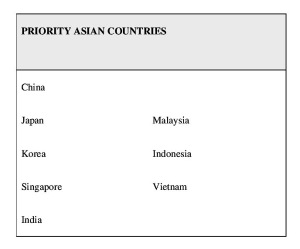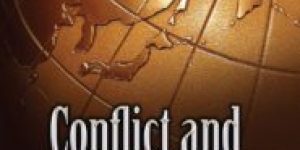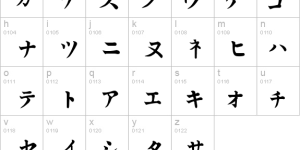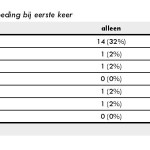The Irish Asia Strategy and Its China Relations: Appendix I ~ A Decade Of The Asia Strategy 1999 – 2009
No comments yet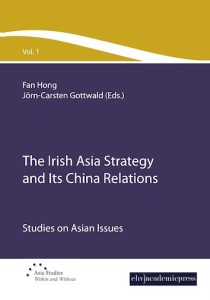 Foreword by the Taoiseach, Bertie Ahern, T.D.
Foreword by the Taoiseach, Bertie Ahern, T.D.
The launch of the next phase of the Asia Strategy marks an important point in the development of political, economic and cultural relations between Ireland and Asia. Following my visit to China in 1998, I authorized the establishment of an Asia Strategy. The aim of this Strategy was to ensure that the Irish Government and Irish enterprise work coherently to enhance the important relationships between Ireland and Asia. It set out a series of challenging targets and objectives with a view to increasing our political, trade and investment ties in the region.
The first five years of the Strategy have been extremely successful. Targets have been met and in many cases considerably exceeded. The two priority markets identified in the Strategy – China and Japan – saw very substantial increases in exports from Ireland during the period. The success of my visit to China in early 2005, with a large accompanying trade mission, is in part a reflection of the achievement to date of the Asia Strategy.
The Government is fully committed to supporting the second phase of the Asia Strategy. I consider it to be essential that we maintain the momentum in strengthening our relations with Asia as we move forward into the next phase. The new Strategy 2005-2009, proposes even more ambitious goals and objectives, building on the achievements of the first five years. It targets not only priority markets but also emerging markets in the region. Most importantly, it seeks to increase the level of Irish exports to € 9 billion over the period.
The new Asia Strategy will be driven by a high-level oversight group. The group will ensure that the Strategy continues to respond to the dynamics of the Asian market. The Group will report to Government on an annual basis.
The next five years promise to be an exciting and challenging time for us. I am confident that we will see tremendous progress for Ireland in establishing a firm presence in Asia. I commend this next phase of the Asia Strategy and look forward to following its progress in the
coming years.
Foreword by Micheál Martin, T.D, Minister for enterprise, trade and employment
In A Decade of the Asia Strategy 1999 to 2009 we note with satisfaction what has been achieved in the last five years and set challenging objectives to be realized in the next.
The Taoiseach directed political focus on Asia some five years ago. All members of the Government share his enthusiasm and commitment for greater interaction between Irish people and those of Asian countries. That is in our mutual interest.
Regular communications and increasing familiarity with Asian peoples are still of relatively recent origin. Yet, linkages have been established across a wide spectrum in recent years. The political, business, educational, media, cultural, social and other relationships that now exist will deepen and widen in the future.
In addition, the presence in Ireland of growing numbers of Asian students, workers and tourists is welcome and also a relatively recent development. It is advancing the process of mutual understanding, while simultaneously conferring economic benefits and responding to manpower needs. We recognize the importance of this contribution and will facilitate its development in a way that respects and values those coming here.
This twenty first century is often referred to as the century of Asia. There are many more decades ahead before it runs its course. The Irish people and Government want to realize the opportunities that each will bring for national and global advancement in all spheres of activity.
The development of trade is the primary objective of the Asia Strategy. Business with priority Asian countries grew significantly during its first phase. Trade statistics last year, when compared with those in 2003, show heartening trends. Our exports to China increased by 19%, to Singapore by 17%, to Korea by 15%, to Thailand by 14%, to Japan by 12%, to India by11% and so it goes on. This growth reflects the hard work of confident and adventurous Irish business people. It reflects the dedication and commitment of motivated State representatives working cooperatively in Asian countries in a national endeavour to further develop trade and business there. That endeavour also engages the support of the President and of the Government of Ireland in concerted efforts to progressively capitalize on trade development opportunities that currently exist, and that are in prospect in the decades ahead.
We could be overwhelmed with considerations of scale and distance. We are not. We are already succeeding and our increasing trade statistics are plotting that success. I know that the publication of A Decade of the Asia Strategy, and the objectives, targets and review mechanism that it comprehends, will add even greater impetus and coherence to this important and strategic endeavour.
In this century Asia will be the economic fulcrum of the world. Its cities, many with populations that are multiples of our own, now provide dozens of markets of millions. With these demographics, marketing and trade development opportunities to sustain and enhance our export-led economic growth are beyond bounds.
We will now renew our commitment and efforts. Cooperatively we will continue to realize our trade development and related objectives. When the strategy for another decade comes to be written in 2009, we will have met and, hopefully, surpassed targets now set out. Of that, have no doubt.
Contents
Introduction
The Asia Strategy 1999 to 2004
The Asia Strategy 2005 to 2009
Primary Objective
Strategic Actions
Political Support for the Asia Strategy
– Exchanges of Visits
– Asia – Europe Meeting (ASEM)
– State Representation in Priority Asian Countries
– Incoming visits
Other Linkages with Priority Asian Countries
– Ireland to join the Asian Development Bank (ADB)
– Establishment of Institute of Asian Affairs
– Mutual Awareness
Localized Relationships with Priority Asian Countries
– Internships
– Memoranda of Understanding
– Twinning Initiatives
Linking Ireland with Asia through Education, Research and Vocational Exchange
– Marketing Education Services in priority Asian countries
– Malaysia
– China
– India
– Korea
– Japan
Internationalization of Irish Education Services
– Graduate Placements
– Co-operation in the field of Research and Development
Developing Tourism Trade with Asian Countries
– Japan
– China
– India
– South Korea
– Art and Asia
Agricultural Trade and Priority Asian Countries
– Food and Drink Exports
– China
– Japan
– Other Developing Asian Markets
Exporting Irish Seafood to Asia
– Bord Iascaigh Mhara to further strengthen its Marketing in Asia
Enterprise, Trade and Investment
– Department of Enterprise Trade and Employment
– Enterprise Ireland
Attracting Foreign Direct Investment (FDI) from Priority Asian Countries
Outward Direct Investment (ODI) to Priority Asian Countries
Resourcing the Asia Strategy 2005 to 2009
Primary Achievement Indicator
Trade Target
Overview of Asia Strategy
Introduction
The Taoiseach identified the need for a concerted and strategic approach to the development of trade with Asia in 1998. It was informed by the fact that, into the future, China and other Asian countries will, to a progressively greater degree, influence political and economic developments throughout the world.
Accordingly, the Government decided to establish a formal context in which the public and private sectors could work co-operatively to realize the economic and other benefits that political and economic linkages with Asian countries can confer. In line with that objective, the Asia Strategy 1999 to 2004 was advanced.
Significant resources have been applied to that purpose, and these have yielded benefits to date. However, there is potential to further build on achievements. Accordingly, and taking into account the experiences of the last five years of the Asia Strategy, the next phase has now been initiated. It will cover the period 2005 to 2009.
The Asia strategy – 1999 to 2004
The main developments in that period can be summarised as follows:
– Visits to Asian countries by the President of Ireland, by the Taoiseach, the Tánaiste and other Government Ministers, with consequential reciprocal high-level political visits, have heightened political awareness on both sides.
– They have provided the basis for the further development of relationships between political leaders and created an environment in which economic, social and cultural ties have been established and cemented.
Extensive efforts have been undertaken with key economic and political decision- makers to raise awareness of Ireland in Asia. In excess of €2 million was provided for this purpose.
Initiatives included:
– Development and publication of information materials.
– Support for visits to Ireland by key media personnel and others with roles in informing opinion and relaying information in Asia.
– Funding provision for the development of long-term institutional arrangements between representative Irish business organizations and their counterparts in Asian countries.
From a bilateral trade development perspective, the following advances have been made:
– In the course of the Asia Strategy 1999 to 2004, merchandise trade exports have increased from € 3.6 billion to over € 6 billion.
– Imports in 2003 reached € 8.8 billion – leaving a trade deficit for that year of € 2.8 billion. This underlines the need to further develop and diversify Ireland’s mercantile and services trade with the region.
– Total exports to Asian countries from indigenous Irish companies are estimated at € 321 million in 2003, an increase of about 15% on the 1997 level but – at less than 4% – a relatively small fraction of total exports to the region.
– Exports to China have increased dramatically – annual export growth averaged around 20% between 1997 and 2003.
– By 2003 some 93 Irish companies had established in Asia. That is double the number there in 1999.
The successful establishment of businesses in Asian markets requires proper planning and resource commitment. This can present significant challenges for smaller companies. However, those challenges are not insurmountable and State and other forms of support are available.
The Asia strategy – 2005 to 2009
The objective over the next five years of the Asia Strategy is to build on achievements to date. In the interests of further developing bilateral trade, that will require advancement not only of economic and trade relationships, but others across a spectrum that includes political, economic, social and cultural dimensions.
An outcome of the first phase of the Asia Strategy has been to highlight the importance of properly targeting Ireland’s export marketing efforts. This will ensure that, in considering opportunities in such a large and populous continent, resources are most effectively focused and commensurate benefits result.
Primary objective
The objective of the Government to be realized within the next five years is to intensify the levels of political, business and other forms of interaction with the priority Asian countries so that Ireland benefits to a significantly greater extent from the trade and other benefits that successful trading with the region can confer. In this context, greater attention will be given to ensuring that indigenous Irish companies avail of business opportunities in these priority countries and to the provision of necessary State and other supports for that purpose.
Strategic actions
Drawing on experience gained over the period 1999 to 2004, and in light of the need to prioritise efforts in a large geographic area with widely varying population densities, the primary focus of the Asia Strategy up to 2009 will be on a limited number of countries.
The countries have been identified on the basis of assessments of general economic and trade development projections in those listed, and of the potential for increasing the foreign earnings of Irish businesses.
In recognition of the possibilities for change in the economic situation of individual countries in the region over time, they will be kept under review, and adaptations made as necessary. In this regard our trade development agencies are already seeking to further develop business and trade relationships with emerging economies in the region. These include, in particular, Thailand and the Philippines.
Trade development opportunities in other Asian countries will continue to be monitored by the Government and the State agencies. The purpose will be to ensure that bilateral trading relationships with such countries are also further developed in the period to 2009 and that foreign earnings potential is maximised.
Political support for the Asia strategy exchanges of visits
High-level political exchanges and trade missions to priority Asian countries led by the President of Ireland, the Taoiseach, the Tánaiste and other Government Ministers have been important in increasing Ireland’s profile, particularly within China. They have facilitated the development of durable political and business relationships.
The most recent visit of the Taoiseach to China marked a further step in this process of strengthening and deepening political and economic relationships. Leading the largest trade mission ever to have left Ireland, the Taoiseach was accompanied by the Ministers for Enterprise, Trade and Employment; Communications, Marine and Natural Resources; Education and Science; and Agriculture and Food.
More than two hundred business people, representative of a range of Irish economic sectors, participated in the trade mission. Business deals to the value of approximately € 126 million were concluded during it. This does not take account of business negotiations that were initiated or advanced. These are expected to yield significant trading benefits and export earnings in the period ahead.
In addition, the trade mission included representatives of a range of State agencies and private sector organisations.
In the course of the visit, agreements were signed to strengthen cooperation in sectors of mutual interest – in agriculture, education, software, and scientific research.
In their discussions, the Taoiseach and the Chinese Premier agreed to continue to encourage and facilitate high-level political visits. They also agreed to develop and promote reciprocal exchanges in other areas that are of mutual interest and benefit. They decided that a coordinating mechanism to advance these objectives will be established.
They set a target of doubling the value of trade between both countries by 2010.
In recognition of the importance of further developing and reinforcing the status and frequency of high-level political visits to priority Asian countries and emerging economies in Asia, such visits will be a central feature of this phase of the Asia Strategy.
They will be planned on an annual basis by Government Departments. They will be coordinated by the Department of Foreign Affairs, in consultation with the Department of Enterprise, Trade and Employment, and other Departments. The high- level political visits will focus on the particular economic sectors that reflect trade development possibilities in destinations to be visited.
The trade development impacts over time of each visit will subsequently be assessed in direct consultation with participating business representatives.
Asia-Europe meeting (ASEM)
The ASEM process was established in 1996 to create an inter-regional dialogue between Asian countries and Europe. It focuses on political, economic, trade and people-to-people issues. The Taoiseach represented Ireland at the ASEM 5 summit in Hanoi in October 2004. That Summit agreed to the enlargement of ASEM to 39 members. Its biennial meetings at the level of Heads of State and Government, and annual meetings of Foreign, Economic and Finance Ministers, will continue to provide platforms for worthwhile bilateral opportunities and contacts with our Asian partners.
State representation in priority Asian countries
In the course of the first phase of the Asia Strategy from 1999 to 2004, Ireland’s official representation on that continent was increased and strengthened. Regional and local representation there is also important to the development of our export trade, as an example, in a country as large as China.
In this regard, the Government has decided to establish a diplomatic mission in Vietnam. It will be located in Hanoi and will open in the second half of 2005. It will have particular responsibilities for Cambodia and Laos also. As well as delivering other tasks, the mission will promote Irish trade and investment interests in the region.
The Government will continue to keep under review the levels and locations of State representation in Asian countries. Adaptations will be made as necessary so as to fully realise the objectives set out in this document.
Incoming visits
The number of incoming visits to Ireland from political and trade delegations has increased significantly over the past five years. Government Departments, State agencies and private sector undertakings will continue to facilitate visiting delegations in the interests of further strengthening ties and of advancing possibilities for bilateral trade development.
Other linkages with priority Asian
Ireland to join the Asian development (ADB)
The Government agreed to join the Asian Development Bank subject to concluding satisfactory conditions for accession. That has now been realised and the terms and conditions of membership were agreed last year.
The Government’s reasons for joining the ADB include the advantages that membership will confer in further advancing Ireland’s bilateral development programme in the region, as well as consideration of the economic benefits that can accrue.
In the latter case, membership will provide opportunities for Irish companies and consultants to tender for projects funded by the ADB. Other member States of the European Union have to date been awarded significant contracts as a consequence of such tendering.
In light of this country’s impending membership, enquiries have already been received from Irish entities interested in working in the region. Access for our business people will have additional advantages in heightening their awareness of Asian countries, providing informed understanding of business culture and practices there and developing new business and professional relationships across a disparate range of economic sectors.
Establishment of institute of Asian affairs
Fostering a better understanding of Asia and its peoples is important to the development of sound economic and trading relationships. The Department of Foreign Affairs and the Department of Education and Science will, in consultation with other Departments, advance proposals for consideration by the Government on the establishment, role, functions and funding of an institute of Asian Affairs.
Mutual awareness
Programmes of media visits designed to raise awareness, both in Ireland and in Asia, will continue to be supported. Such visits will serve to further inform Irish people about life, living and business cultures in Asian countries, and the peoples there of comparable issues in Ireland. Campaigns with that objective have to date been successful in conveying a better sense of this country and of the different aspects of its national life.
Localised relationships with priority Asian countries internships
The Shanghai Internships Programme provides for exchanges of officials. It has been successful in developing important contacts within the administration responsible for that city. It has also resulted in an increased awareness of this country in political, economic and cultural circles there. Extension of the scope of the programme is in prospect and exchanges are now being developed with Hong Kong.
Under the auspices of the Department of Foreign Affairs, the internships Programme will continue to receive support.
Support will also be provided for scholarships and internships for Asian Government and commercial personnel to allow them familiarise themselves with administrative, business and educational spheres of land.
Memoranda of understanding
In the period 1999 to 2004, a number of Memoranda of Understanding and similar contracts have been signed by representatives of the State, business and other organisations at national, regional and local levels. Their purpose is to formalise and specify the nature of joint cooperative endeavours that both parties undertake to comply with, be they of a trade development nature or otherwise. It is in the national interest that the provisions of all such undertakings are comprehensively respected and implemented.
The High-Level Group described below will be informed periodically of experiences in implementing the provisions of such Memoranda and contracts, and of any proposals for agreeing new ones with Asian counterparts.
Twinning initiatives
Twinning of Irish and Asian cities, towns and regions can assist the further development of personal and business relationships. Such twinning arrangements exist in several Asian countries. The concept is popular there.
They have a positive contribution to make in strengthening country-to-country ties. They can also contribute to facilitating the development of business relationships that exist on foundations of mutual confidence and trust. Accordingly, twinning arrangements will again be supported in this phase of the Asia Strategy.
Linking Ireland with Asia through education, research and vocational exchange
Marketing education services in priority Asian countries
International Education is one of the fastest growing areas within the International Services sector worldwide. It has recently been estimated that the global number of students studying abroad will rise from 2.1 million in 2003 to over 5.8 million by 2020.
Of particular relevance to Ireland is that the great majority of these students are opting for courses in information and communications technologies, hospitality management, business studies and the sciences. These are disciplines in which there is capacity in our education
system to respond to demand.
As the greater part of this global cohort is projected to come from the priority Asian countries indicated, it can be a source of educational enrichment while also being materially beneficial. Enterprise Ireland, working closely with the International Education Board of Ireland, has been particularly active in promoting the benefits and advantages of our education system. Malaysia, China, India, Korea and Japan are important countries of origin.
Malaysia
There is a long established tradition of education linkages between Ireland and Malaysia. Currently about 1,300 Malaysians are studying at third level here. This figure is projected to increase to 2,500 by 2009. Such students are particularly interested in pursuing courses in information and communications technologies, engineering, business studies and medicine.
China
China continues to be the primary focus for our third level colleges. To date this year, twenty-one colleges have participated in Education Fairs in that country. They were organised by Enterprise Ireland and have over the past five years been a feature of its education promotion activities.
Currently, in excess of 2,900 Chinese students are taking degree courses in Irish colleges. This number is projected to increase to more than 5,000 by 2009. In 2005, estimated income of approximately €60 million in direct fees and off-campus spending will accrue.
In excess of thirty-five co-operation agreements have already been concluded between third level Irish and Chinese colleges. Such co-operation will be an important factor in attracting greater numbers of high-quality students to locate here in the future.
An Institute of Chinese Studies to enhance the understanding of Chinese culture and language in Ireland is currently in the process of being established. It is expected to be operational in the academic year 2005/2006.
India
India has great potential to contribute to the advancement of Government policy on developing our education services. Irish Colleges have been active in marketing there since 2000. To facilitate them, Enterprise Ireland organises annual promotional visits to Delhi, Bangalore, Mumbai, and now to Chennai.
In addition, to advance the promotion of Irish educational services, an area education manager has been based at the Irish Embassy in Delhi for the past three years. The manager plays an important role in advising and supporting marketing representatives of our third level colleges to achieve the objectives of their expansion plans and in encouraging visits by Indian media and education sector representatives to Irish colleges.
The number of Indian students attending Irish Colleges grew significantly in the past five years. In 2004, 621 students were granted visas to study in Ireland. The target is to increase that figure to 4,000 by 2009.
India is predominantly a source of post-graduate students and about 70% of all Indian students in this country are in that category. This level of educational attainment on arrival is of particular interest and benefit to our colleges.
Korea
Activity in this market is of recent origin. However, progress is now being made as a consequence of trade promotion visits by Government Ministers. In addition, in 2004 a Korean delegation of education representatives visited colleges here and a number of representational agreements were signed as a consequence.
Current numbers are low – about 50 students are at present studying in Ireland. However, this level is expected to increase to around 1,000 by 2009 as links with both educational representatives and Korean colleges are intensified in the interim.
In addition, Enterprise Ireland has recently appointed a representative in Seoul. She will also be actively promoting the advantages of Irish education in Korea.
Japan
Enterprise Ireland is developing our education profile with Japan also. Again, the number of Japanese nationals currently studying at third level here is low – just over 100. There is, however, potential to significantly increase that number. To realise the potential, further visits to Ireland by Japanese media and education representatives will be arranged. In addition, high-level visits to Japan, as well as to Korea, are in prospect. These will assist in advancing the internationalization of Irish education, and in trade development generally.
Internationalisation of Irish education services
The objective of promotional efforts is not only to increase the overall number of Asian students coming to study here, but also to increase and diversify the number of college-to-college links and cooperative arrangements in place. Already, this is being done very successfully in China.
Educationalists recognize that over-reliance on any particular market may not be positive and may impact on quality and standards. There could also be issues in marketing terms as a consequence of any such over-reliance. Accordingly, the Government will seek to ensure that diversity in the mix of nationalities continues to be a feature as it further develops the internationalization of Ireland’s education services.
The promotion of Ireland as a destination for Asian students will be an important issue in implementing the recommendations of the recent report on the Internationalisation of Irish Education Services. These recommendations will be implemented in the near future.
Educational links have to date been key in advancing relationships between Ireland and Asia. Graduates and students from the priority Asian countries will now be a valuable resource as this country seeks to strengthen its research and technological base.
A scholarship scheme will be established to attract top Asian graduates and students to Ireland during this phase of the Asia Strategy.
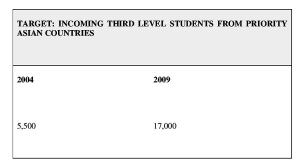 In addition, the Government is aware that in the future, and having completed their formal studies here, Asian students will form an important network of contacts and trade partners for Ireland on return to their native countries. The promotion and dispersal of such networks will be supported through the development or establishment of Alumni Associations in priority Asian countries.
In addition, the Government is aware that in the future, and having completed their formal studies here, Asian students will form an important network of contacts and trade partners for Ireland on return to their native countries. The promotion and dispersal of such networks will be supported through the development or establishment of Alumni Associations in priority Asian countries.
Alumni Associations have already been established in China (Beijing), Singapore and Malaysia. They consist largely of people who graduated from Irish colleges some time ago. Support will be provided for the establishment of new Associations in Shanghai, Hong Kong, and, eventually, in Japan and Korea.
In all major centres where Enterprise Ireland has offices younger graduate returnees will be contacted and encouraged to take membership in, or to establish, Alumni Associations. Support will be available in the initial period following their establishment or refreshment.
The upward trend in Asian students coming to study in Ireland, the increasing number of colleges joining the internationalisation programme and the positive and reinforcing impacts that new measures and high-level political visits will yield, should ensure that this target will be reached, and even surpassed.
Graduate placements
Establishing lasting partnerships and networks between Irish professionals and Asian counterparts is important to further develop trade and tourism. A focused Graduate Placement Programme for Asia, drawing on the existing FÁS programme and other support systems administered by the European Commission, can give Irish graduates opportunities to gain valuable training and experience in Asian companies. They can also contribute to eventually establishing important business linkages between Asian and Irish companies and to promoting a greater understanding of Asian business culture here.
Co-operation in the field of research and development
Existing collaboration between Science Foundation Ireland and counterpart organisations in China, Japan and Singapore has raised the profile of the economic success of Ireland. Such collaboration also assists in communicating the advantages Ireland offers as a location for advanced research and development, and the possibilities for sourcing high-tech products and services here. The reinforcement of this collaboration will be a feature of the next phase of the Asia Strategy 2005 to 2009.
Developing tourism trade with Asian countries
As the economic centre of the world moves eastwards, it is important for the medium and longer-term future of Irish tourism that it develops the potential of emerging long-haul markets. Asia will become an increasingly important continent for tourism to Ireland in the longer term. It is estimated that by 2020, over one third of global outbound tourism will originate in Asia, with over 100 million tourists coming from China alone. Tourism Ireland has been working to lay foundations to capitalise on this projected growth in the years ahead. The markets identified as having the greatest potential are Japan, China, India and South Korea. Key developments in each are indicated below.
Japan
Tourism Ireland appointed a new representative company in Japan in 2003. Visitor numbers in 2004 were about 25,000. A 10% increase is forecast in 2005. To assist in realising this target, participation of tourism sector representatives in a trade mission to Japan this year, as well as their involvement in a major tourism trade and consumer fair there, has been arranged. A dedicated website and a marketing book have also been designed and produced for the Japanese market.
China
Approved Destination Status was conferred on Ireland by the Chinese authorities in 2004. Subsequently, websites were made available in Chinese. In addition, 15,000 marketing books in Chinese were provided. Tourism Ireland has recently opened an office in Shanghai and appointed necessary staff there to manage its efforts to attract an increasing number of tourists from the region to holiday in this country. A three-year tourism development programme is now being finalised. Among other issues, it will provide for participation at trade and consumer fairs, media visits and tour operator participation in marketing events. At least two such events will be attended in 2005 – the World Travel Fair and the China International Travel Market Fair.
India
A part-time representative company was appointed in India in 2004. In 2005, golf and film industry initiatives will contribute to raising awareness of Ireland with targeted audiences. Tourism Ireland will participate in a Location Film Exhibition in Mumbai and will also facilitate the participation there of five film production companies from Ireland.
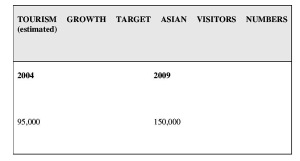 South Korea
South Korea
In 2005 Tourism Ireland will be capitalising on niche market opportunities that arise. A marketing book and website detailing tourism information on Ireland has been made available in South Korea.
Tourism Ireland has estimated that, assuming a stable international economic environment, visitor numbers from priority Asian countries will increase by more than 50% in this phase of the Asia Strategy.
Art and Asia
Through the Department of Arts, Sport and Tourism, the Government allocated almost € 3 million in 2004 to promote cultural exchanges with China. These have been highly successful in building relationships between both countries. Such exchanges, and other linkages to promote mutual cultural awareness, will be further developed in this phase of the Asia Strategy. Also under the auspices of the Department of Arts, Sport and Tourism, a new organization named Culture Ireland/Cultúr Éireann has recently been established to promote awareness of Irish art and artists abroad. As there is complementarity between developing cultural relationships with priority Asian countries and the key trade promotion objectives of the Asia Strategy, the new body will work closely with the High Level Group in order to optimise potential synergies.
Agricultural trade and priority Asian countries
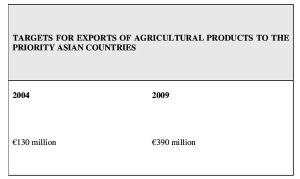 The Irish agriculture and food industries will remain export oriented. Their progress will depend on ability to maintain or expand market share at home and overseas. In this phase of the Asia Strategy the sector is likely to operate in a highly competitive environment. This reflects the advent of a more liberalised agricultural trade regime. In addition to increased competition, logistical constraints can be impediments to developing trade in food and drinks products with Asia.
The Irish agriculture and food industries will remain export oriented. Their progress will depend on ability to maintain or expand market share at home and overseas. In this phase of the Asia Strategy the sector is likely to operate in a highly competitive environment. This reflects the advent of a more liberalised agricultural trade regime. In addition to increased competition, logistical constraints can be impediments to developing trade in food and drinks products with Asia.
There are, however, opportunities to increase existing business in dairy products and to establish and expand trade in pig-meat, beef, food ingredients and alcoholic drinks. The aim of the agricultural sector in the period to 2009 is to consolidate and further develop current markets, to establish new markets, to increase the numbers of exporters active in the area and to formalise trading arrangements as appropriate. The overall objective to be realised in that period involves a threefold increase in the value of agricultural exports.
Food and drink exports
As negotiations progress on the removal of the remaining barriers to food imports into Asian countries, the main objectives of Bord Bia will be to develop in-depth market knowledge and to increase the profile of Ireland as a supplier of quality food and drink products. Key marketing activities will include providing exporters with current and comprehensive market information, participating in trade fairs, organising seminars for targeted groups and implementing and monitoring a programme of inward buyer visits.
China
With a population of 1.3 billion people and an economy that is now the fastest growing in the world, China is attracting the attention of the major global food manufacturers. As the Chinese economy continues to grow, its level of self-sufficiency in food will continue to fall. It will experience a radical change in the profile of consumer needs, with demand for commodities and for processed foods continuing to increase. There is also evidence of an increasing demand from China’s increasingly affluent middle class for quality branded import products.
Japan
Japan presents a market for predominantly high quality goods. It offers suppliers better prices and margins than many international markets. However, it is also rightly insistent on detailed and accurate product specifications, consistency and dependability of supply and quality and authoritative assurances on food safety. In taking account of this background, Bord Bia will strengthen contacts with key importers and buyers and provide on-going feedback to Irish exporters on market opportunities for Irish food products. Special emphasis will be on emerging markets for functional foods and drinks.
Other developing Asian markets
Opportunities for Irish food products in other Asian markets will also be pursued. The Philippines, Indonesia, Malaysia, Taiwan, Thailand and Singapore will be targeted in the marketing of dairy products and infant formula. The Philippines and Indonesia will be the focus in the marketing of meat and meat products. The overall challenge for Irish exporters in the agricultural sector is to understand the diverse and complex nature of the different priority Asian markets and market segments, and to tailor and promote their products accordingly.
Exporting Irish seafood to Asia
There are significant opportunities to increase exports of seafood and related products to the priority Asian countries. Bord Iascaigh Mhara (BIM), in cooperation with Enterprise Ireland, is responsible for the marketing of these products. During the first phase of the Asia Strategy, there has been growth in exports of Irish seafood. Exports to China, including Hong Kong, have been particularly buoyant for a range of seafood products. These include crab, oyster, mackerel and horse mackerel products. The positive export growth trend is the outcome of marketing strategies deployed over the past eight years. In that period BIM has worked closely with a number of Irish seafood companies that are interested in developing the potential of the Chinese market. Recent marketing initiatives include participation in a number of key seafood trade events in the region and availing of the opportunities those trade missions, particularly those headed by Government Ministers, present to achieve new sales and to diversify export destinations for Irish seafood products.
Bord Iascaigh Mhara to further strengthen its marketing in Asia
Trade in seafood products has increased over the past five years. However, BIM appreciates the need to maintain and strengthen business links in the period to 2009. This will allow exporters to more fully realise the opportunities that exist in niche segments of the seafood markets of priority Asian countries.
Accordingly, BIM will strengthen and diversify its trade development Programme to sharply focus on:
– market research and intelligence gathering;
– trade development through all effective methods, including participation in key trade fairs and availing of market intelligence exchange opportunities;
– planning and coordinating market assessment visits by Irish company representatives targeting the region;
– encouraging and facilitating inward buyer missions to Ireland from priority Asian countries.
BIM does not have a permanent presence in these Asian countries. However, through cooperative working arrangements with Enterprise Ireland, it has access to the resources of that organisation in the region. This facilitates an effective and unified approach on the part of these two State agencies to the identification and development of market opportunities for Irish seafood producers in priority Asian countries.
Enterprise, trade and investment
Department of enterprise trade and employment
Trade missions will continue to be an important feature in assisting enterprises to identify market opportunities. Such missions will be directly linked to planned annual visit programmes by the Taoiseach and other Government Ministers to particular countries in Asia. These programmes will be submitted to the Department of Enterprise, Trade and Employment by relevant State organisations not later than the October preceding the year to which they refer.
In consultation with Government Departments and State agencies, the Department of Enterprise, Trade and Employment will propose a system to monitor the business development impacts of trade missions. That system will be implemented through continuing dialogue with representatives of participating business undertakings, organisations and other institutions to determine the business development advantages that result from their participation in particular trade missions. Outcomes will be the subject of periodic reporting to the High Level Group that is being established to ensure the effective operation of the next phase of the Asia Strategy in the period 2005 to 2009.
Enterprise Ireland
Helping its clients to win international sales and to establish or further develop business in Asia are priorities for Enterprise Ireland. Providing companies with essential market information, introductions and other supports are elements in achieving these priorities as they enter and develop markets there.
Accordingly, Enterprise Ireland will now renew and strengthen the service it offers to ensure the most effective State support for the national exporting drive in the priority Asian countries. The development of new initiatives to address sales skills and capabilities is important to ensure future success. Similarly, providing access to mentors in the region, developing opportunities for graduates to gain international selling experience and helping companies to recruit skilled staff are important elements that necessarily underpin achievement.
Enterprise Ireland will publicise details of general and niche market opportunities of interest to particular sub-sectors of companies in Ireland. It will also provide a signposting and advisory service to companies seeking to internationalise through overseas acquisitions or outsourcing.
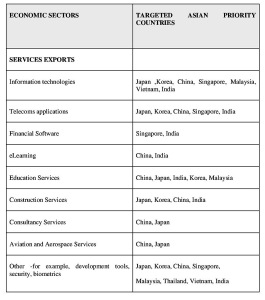 Enterprise Ireland has set a range of targets to be achieved in the course of this phase of the Asia Strategy. These include:
Enterprise Ireland has set a range of targets to be achieved in the course of this phase of the Asia Strategy. These include:
– Increasing the number of Irish companies that have already established in Asia from 93 in 2003 to 215 by 2009.
– Actively marketing education services available with a view to increasing the number of third level students from priority Asian countries undertaking studies in Ireland, from approximately 5,500 in the academic year 2003/2004 to 17,000 by 2009.
Enterprise Ireland has also identified the economic sectors in priority Asian countries listed below for particular marketing attention on behalf of indigenous Irish companies. In view of the probable need to alter these targeted sectors over the next five years, because of likely changes in industrial growth profiles, developments in these sectors will be reviewed annually by Enterprise Ireland. The outcome of such reviews, and any recommendations for change as a consequence of them, will be communicated to the High Level Group.
Attracting foreign direct investment (FDI) from priority Asian countries
In implementing the Asia Strategy to date, attempts to source foreign direct investment were primarily focused on Japan and Korea. The rapid development of the Chinese economy has created new opportunities.
IDA Ireland recognises China as an area with excellent potential for future FDI opportunities. In such a complex market a systematic and thorough approach is needed to properly assess inward investment potential.
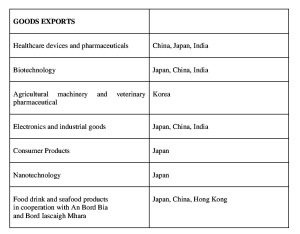 An experienced team of senior IDA staff with in-depth knowledge of Asia has been established to explore the market potential from an FDI perspective. Team members recently completed a fact-finding mission to China and had discussions with Government officials and representatives of both multinational and indigenous Chinese companies.
An experienced team of senior IDA staff with in-depth knowledge of Asia has been established to explore the market potential from an FDI perspective. Team members recently completed a fact-finding mission to China and had discussions with Government officials and representatives of both multinational and indigenous Chinese companies.
IDA also recently commissioned consultants to carry out an assessment of the potential for value-added Chinese investment in Ireland. Its team is planning another trip to Shanghai early in 2005 to coincide with the completion of that assessment.
Existing IDA resources in the Asian region will be deployed to support the new strategy as it develops and will be supplemented by such additional resources, including new offices, as are considered to be warranted by the assessment.
Outward direct investment (ODI) to priority Asian countries
The level of total trade will continue to be a key indicator of the state of our economic relationships with priority Asian countries. However, direct investment from Ireland in such countries is also likely to grow in importance.
The evolution of Irish-owned industry towards higher value-added activities, higher output and higher productivity is an important element in ensuring a solid economic foundation for long-term growth in competitiveness, exports and employment. The progress made by some Irish companies in relation to product sophistication and their scale of operation indicates that, for logistical and marketing reasons, outward direct investment is now viewed by business leaders as a viable and valuable strategic company development option.
Outward Direct Investment to the priority Asian countries will continue to be undertaken by ambitious and dedicated business people who manage Irish companies of varying sizes. Some will be in well-established sectors, others will form part of the growing cadre of small Irish-based high-technology companies that are primarily characterised by a global business and trading orientation.
Decisions to invest in the priority Asian countries indicate a willingness to act on a number of fronts. These include developing new outlets for goods and services and accessing new distribution channels and networks. For logistical reasons it will be necessary for some companies to have production facilities in the region. The business justification for investing in Asia includes gaining access to skills and expertise and acquiring or developing new technologies that can be transferred back to Ireland.
The Irish business environment is supportive of high value-added activities. In that context, outward direct investment to priority Asian countries, and benefiting from the opportunities it provides for particular Irish companies, is consistent with national economic and social policy objectives. These most importantly include increasing or retaining employment levels, progressively improving average wage rates and further enhancing the living standards of all and, in particular, those of the economically and socially disadvantaged.
Resourcing the Asian strategy 2005 to 2009
As in the period 1999 to 2004, when over € 2 million was provided, State funding will again be made available to implement certain of the initiatives and activities outlined above. This funding will be applied to ensure that the presence and the consciousness of Ireland in Asian market places is further reinforced so as to advance the attainment of primary objectives described above.
In addition, large-scale resources are already provided in existing budgetary allocations for the development of trade with priority Asian countries. These will be reviewed on an annual basis and, in light of the commitment of the Government to the Asia Strategy, will be appropriately adjusted by reference to the outcome of evaluation and review. This evaluation and review will take into account recommendations of the High Level Group described below.
Government Departments will now plan their respective involvement in the Asia Strategy to 2009. That planning should be such as to ensure that these Departments make the fullest contribution, consistent with the policy responsibilities they have, to the realization of the trade and related objectives of the Asia Strategy of the Government. That will include providing necessary resources to ensure a concerted and strategic approach and operational effectiveness in delivery of the provisions of the Strategy in each relevant Department.
Primary achievement indicator
A core objective of the Asia Strategy 2005 to 2009 is to develop relationships between Governments, business organisations and Irish and Asian peoples generally. This is in support of the central focus on increasing trade with that continent, creating wealth in Irish companies, particularly in smaller companies, and contributing to national prosperity, employment creation and maintenance.
The most important indicator of success at end-2009 will be the extent to which Ireland has further developed its export trade with the priority Asian countries outlined above. A concerted national endeavour, comprehending all involved in the promotion of export trade and services, will be maintained, reviewed and reinforced over the next five years. Results achieved in the course of the last Asia Strategy have been good. They provide a solid basis for the Government’s expectations of doing much better in the development of trade with Asia over the next five years.
Trade target
The primary target for the Asia Strategy is to increase the value of Irish goods exports to the priority Asian Countries to €9 billion by 2009. To meet this target it will be necessary to at least double exports to developing countries such as China and Vietnam. Exports to developed markets in the region, such as Japan, are unlikely to grow at this rate. The goods exports target indicated is achievable. The expectation of the Government is that it will be realised, and exceeded, by 2009.
Overview of Asia strategy
The Secretary General of the Department of Enterprise, Trade and Employment, in co-operation with the Secretary General of the Department of Foreign Affairs, will chair a High Level Group to oversee the implementation of the Asia Strategy. That group will be small in number.
The High Level Group will maintain a strategic overview of progress in implementing the Asia Strategy and ensure that it continues to reflect and respond to the dynamics of the priority Asian countries.
NOTE
[i] “A DECADE OF THE ASIA STRATEGY 1999-2009” Department of Enterprise, Trade and Employment, Dublin, 2006.
You May Also Like
Comments
Leave a Reply
